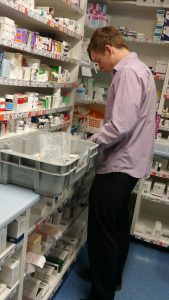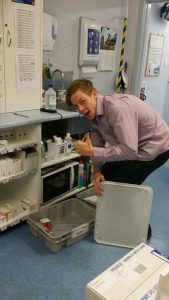This is the first ever guest post on my blog, and I’m delighted that it’s written by Anita Heiss, super talented author, Manager of the Epic Good Foundation, and a very good friend of Stuart and mine.
Glenn MacDonald is a talented boxer who has aspirations to work in film and television. He has just nailed his NSW HSC and is about to start the UNSW Prep Program. Glenn is also a proud Dhungutti man, but what’s most exciting for us is that he has just completed an Epic Pharmacy traineeship in Kempsey.
Glenn joined the Epic group two years ago following an approach by the Mid-Coast Connect branch of TAFE. It was at that time the Kempsey office became aware that the Pharmacy Guild provided financial support to those who took on Indigenous trainees. The intent of the traineeship program is to keep kids in school for Years 11 and 12, but also to see them graduate with a with Certificate II in Community Pharmacy, thereby providing employment opportunities at the end.
At the same time Rachel Taylor, Director of Pharmacy, first learned of the extensive social disadvantage for kids in the area, and she was immediately keen to be part of a program that would help create local role models for other young Indigenous people. Glenn was interviewed in March 2014 and started with Epic the following month.
For his part, Glenn was attracted to the opportunity for an education that took him out of the classroom one day per week. ‘I didn’t really enjoy school. I found being in the classroom difficult, so working and learning hands-on in here made the experience of education really interesting. As part of the traineeship I did everything; dispensing, taking stock to wards, deliveries, printing out invoices and so on.’
Importantly, the traineeship was a chance for Glenn to think about his future, even if it meant he decided he didn’t want to go into pharmacy. ‘I was trying to find something to do with myself. The traineeship was presented to me, and I used it as a way to figure out what I wanted to do, and I loved it. I took every day in my stride, and there was constant support from the fellas down here at the pharmacy. It’s more like a family than a workplace.’
The terms ‘support’ and ‘nagging’ are used interchangeably in the conversations between Rachel and Glenn when talking about his role as the ‘baby in the family’. They both laugh at how all staff were concerned about Glenn’s future after the traineeship, and how he was constantly grilled for the two years about his schoolwork and his plans.
The program was a win-win for both Glenn and the pharmacy though, as Rachel says, ‘Glenn is a remarkable kid. He is a bright boy and could’ve done anything. We have seen him evolve over time and we helped him choose a path. But it’s important that we are also part of growing the pool of pharmacy technicians.’
It is this commitment to increasing the number of Indigenous pharmacists in Australia that also interests us at Epic Pharmacy. In 2011 there were only 28 Indigenous pharmacists in Australia. We understand there are many reasons related to this including the challenges around getting Indigenous kids to do science and chemistry at school, right through to the recruitment and retention of Indigenous students and lack of support at universities.
As Epic Pharmacy works towards establishing and implementing our first Reconciliation Action Plan (RAP) in 2016, we are keen to understand and promote what works in terms of securing more trainees into the sector, with the goal of increasing the number of Indigenous pharmacists and pharmacy technicians.
The benefits of more Indigenous people in our sector are highlighted by Rachel who says, ‘In hospitals, there is an expanding role for pharmacy technicians. Having an Indigenous pharmacy technician trained would be a good thing, as I’ve learned there are certain customs and morays that many non-Indigenous people would be unaware of. For example, ideally women should counselled by women, men by men etc. So having trained Indigenous technicians means they can counsel a huge part of the population we are currently not reaching. Also, patients knowing a community member is available in the hospital whether they need a pharmacist or not, provides a level of moral support that makes difference. I’m happy we went from nothing to one, then one to two.’
We’re pleased to see Rachel Taylor has secured two Indigenous trainees for 2016 – Sarah Heuston and Chloe Lovegood have just started. This happened again with the assistance of Mid-Coast Connect, who Rachel says are in constant communication with her and offering support to the trainees. ‘It’s about the trainee not being abandoned once being offered a place.’
For the next little while, Glenn will maintain his four days per week working in the pharmacy before he heads south to follow his dreams. His message to other young Indigenous people is: ‘Embrace every opportunity. Do a traineeship. Get qualifications. Build up your network of people who want to help and support you reach your goals.’
And for the pharmacists reading this, Rachel strongly recommends: ‘If there is an employer out there anywhere who has any opportunity at all to take on an Indigenous trainee they should. My experience has been hugely positive. The benefits of young people alone are great, they think differently to someone of my age. Let’s lose that negative saying The youth of today… and let’s link into what young people have to say about things and give them chance. School-based traineeships are a blessing.’

